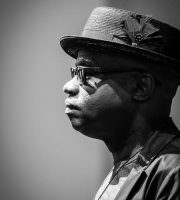by Randall Horton
Crashing in (always in), surge after surge from the difficult storm, four-foot whitecaps sing, “I wanna be closer than most,” to the edge of the New England coastline, which waits anxious, like a lover in need of remedy: to feel the baptism, the violent collision of Atlantic remnants, a union colligated to repeat itself, the terms incomplete. The wind increasingly rapid, carries faint echoes whispering “the glorious body of the event is a work of art,” of the unremembered—those stolen whose bones lay railroad track to (us): the last and beginning of another. Penetrating into the Sound’s crook, to empathize yesterday’s memory, to create new memory, a storm surge of memory, of bodily constrains—a man and a woman, skin color, (us): societies’ inescapable failure, but most of all, the aesthetics of the oppressed—a culmination. One could say the “event,” is the culmination of bodily experiences, albeit human or nature. Something within the eye of the storm ever-forming (myriad wind patterns), always, and so, this “event” (natural) mirrors the ever-forming body of language (human), created by multiplicity of voice, interaction, all that is (us). Trees bend submissive; branches, broken and splintered, litter the evacuated (erased) streets. Fast-fluttering maple leaves speak in tongues: to be free is to not speak free—just be. Threnody of sound coming off the Sound. Desolate, everything desolate and traumatic is the image. Traffic lights hang from thin cable, swinging red, green and yellow so as the wind goes. No dogs frolicking in salt water nor sniffling garbage cans, or just plain howling alongside the muscular gales. Gulls, redacted from flight, from piping new trajectories (for a second), are close by, unseen—humanity’s cue: respect the quite before the storm. Dear Writer, its funny how the cumulative process, the wind, our “past,” alters discourse for the sake of the repeating narrative. The poet Christopher Stackhouse posits that “an artistic event is the becoming form/something that was not." Say phenomena languages the event, something becoming from the mortality of those that claim is or to be at the expense of those conditioned by the social environment in which they live, to be ain’t, or not. Let us say the subject’s valuation is steeped in a series of events to determine or instigate new phenomena. Say the “new” is the “event horizon,” the pinnacle point through which aesthetic is born. There is always a dominant narrative to push through, to runaway from, as against.
Last updated July 22, 2021




